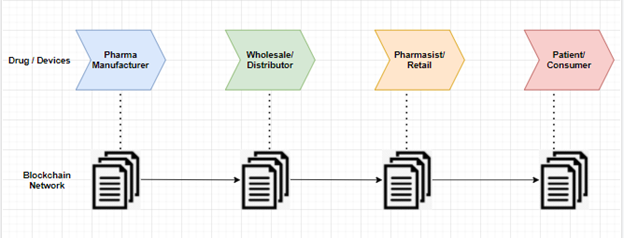INTRODUCTION
Nowadays, Blockchain Technology is one of the most popular and disruptive technology in the world. It has been applied not only in cryptocurrencies but also in many fields like traceability, supply chain management, asset management, game. According to the important feature of Blockchain Technology such as: Distributed, immutable, transparent, security… and so on, multiple industries are adopting the Blockchain technology to improve efficiency of application and platform. One of the industries that are looking to adopt the blockchain is the healthcare industries.
This article will list three healthcare sectors which are can innovate base on Blockchain technology. Each case studies, we will show examples from companies, labotories or pilot project. From these instance, we can get more useful information is that what are benefits of Blockchain technology in Healthcare. Moreover, this paper also demonstrate some technicial points which are relate to encrypt, decrypt and hash data. It is useful for health data exchange.
Why we need to apply Blockchain Technology in Healthcare?
Let go through each case study to gain a comprehensive explanation
1. Credentialing information
There are many challenges of credentialing information such as inefficient data collection, duplicate records, and data integrity. However, the most importance is data inaccuracies.
With simple example, this article show how Blockchain can improve Credentialing information system. Currently, Covid-19 is a pandemic in the world, the challenge is how we check people before they enter the events? Firstly, patient go to hospital to check Covid-19, then he get certificate about this. Then he download mobile application and open it to get data and certification. When he join events or organization like university or stadium, receptionist of event can check his certificate before he go entrance gate. Almost patient’s data and certificate will be hashed and stored in Blockchain which make system become more security and accuracy data. Besides, consensus algorithm to valid data

Companies to watch
a. SnapNurse (https://snapnurse.com/)
It’s not nurse was founded in twenty seventeen. It’s an on demand technology platform that connects preconvention nurses directly with health care facilities to fill empty slots. The first company that applies block chain software through nurse token for credentialing. This allows nurses to carry portable authorization passports for instant approval that new centers they replace the typical nurse staffing agencies that charge a markup by automating the credentialing and verification process, as well as the nursing scheduling process.
Snapper’s has become extremely popular with nurses as well as nurse managers, especially during this time due to increased demand on nurses across the country and can offer nurses higher pay while reducing costs to the hospital system by removing intermediaries such as the staffing agencies.
SNAP Nursing is a great example of how distributed ledger technology, particularly applied to credentialing.
b. Intiva Health (https://intivahealth.com/)
They focus on MEDICAL CREDENTIALING SOFTWARE. The solution is a win-win for providers, patients, and facilities! The credentialing process is fast and hassle-free. With our credentialing software providers can start treating patients sooner, revenue is boosted, administrative work is reduced, and there is more time for patient care.
c. Synaptic (https://www.synaptichealthalliance.com/)
In its first pilot project, announced in April 2018, Synaptic Health Alliance is tackling the high cost of healthcare provider data management, testing the premise that administrative costs and data quality can be improved by sharing provider data inputs and changes made by different parties across a blockchain.
2.HealthCare Record and Data Exchange
Patient should have complete heath data history and records. It is mainly function of HealthCare Record. After, patients have fully data how can they share these information to another person of organization.
Electronic Medical Records (EMRs) is highly sensitive private information in healthcare industry. Therefore, when the system sharing these data should ensure privacy, security, availability. Besides, lack of interoperability between organizations are challenges. These providers don’t trust together, and they use different standard implementation ((HL7 or FHIR). Moreover, scalability concerns is a limitation of centralize data exchange. How users can export health data from system and import to another system.
How Blockchain can improve HealthCare Record and Data Exchange?

One of the most important requirements of data exchange is safe data and data privacy. Luckily, almost Blockchain framework support private key and public key for transfer information in non-trust system. While private key will be used for signature and decrypt data, public key will be used for encrypt data.
Example coding generate public key, private key and sign transaction
let healthContractInstance = new web3.eth.Contract(abi, contractAddress);
//Generate Patient's Keys
let patient_wallet = ethereumjsWallet.generate();
healthContractInstance.addPatient.new(patient_wallet.getPublicKey().toString('hex'));
let data = healthContractInstance.methods.addPatient(patient_wallet.getPublicKey().toString('hex'));
let rawTx = {
gasPrice: web3.eth.gasPrice,
gasLimit: '300',
from: patient_wallet.getAddressString(),
nonce:'0x0',
data: data.encodeABI(),
to: contractAddress
};
let privateKey = ethereumjsUtil.toBuffer("0x" +patient_wallet.getPrivateKey().toString('hex'), 'hex');
console.log("Patient privateKey:"+ patient_wallet.getPrivateKey().toString('hex'));
let tx = new ethereumjsTx(rawTx);
tx.sign(privateKey);
web3.eth.sendSignedTransaction("0x" + tx.serialize().toString('hex'),
function(error, result) {
if (error) {
console.log(error)
result.status(500).send({
error: "An error occured"
})
} else {
console.log('Register the Patient on blockchain, successfully !! and Patien txHash: '+result);
Moreover, in order to ensure security and privacy, we can use Proxy ReEncrypt (PRE) solution. PRE is a set of algorithms that allows you to encrypt some text with your key and then alter the ciphertext so that it can be decrypted by another party without revealing your key. To alter the ciphertext, you need the other party’s private or public key, based on whether you are using interactive or noninteractive PRE algorithms, respectively.
NuCypher KMS is a decentralized KMS, encryption, and access control service. It enables private data sharing participants in public networks in security and privacy. NuCypher provides PRE libraries for Python and Java.
Encrypt data example with NuCypher
from npre import bbs98
pre = bbs98.PRE()
import base64
import sys
publicKey = base64.b64decode(sys.argv[1])
encrypted_message = pre.encrypt(publicKey, sys.argv[2])
print(base64.b64encode(encrypted_message))
Companies to watch
a. GuardTime (https://guardtime.com/)
Guard Time is actually one of the largest enterprise block chain since 2007. Globally, they offer their proprietary keyless signature infrastructure or KCI Block Chain. They focus on personal record, Universal health identity and clinical trials. They are researching about data security, privacy and cryptography, with a focus on post-quantum / hash-based cryptography, privacy-preserving mechanisms including zero-knowledge systems, differential privacy.
b. Medibloc (https://medibloc.org/en)
Medibloc suggests innovative paradigm to healthcare industry by developing a patient-centric healthcare data solution to make everyone’s life healthier.
c. Patientory (https://patientory.com/)
Patientory ensure your data is secure using blockchain technology. They empower end users globally with a secure platform to manage and transfer their health data, to achieve actionable insights for improved health outcomes and well-being.
3.Drug and Device Supply Chain Management
Supply Chain Management is one of the most popular which can apply Blockchain Technology. Blockchain will solve traceability problem in this situation. There are many challenges for Drug and Device Supply Chain Management Solution
o Misplaced and stolen devices
o Compliance with unique device identification (UDI) requirements
o Counterfeit drug
o Drug Overdosing
o Serialization and traceability regulation
In Blockchain technology, supply chain management will be immutable and transparent. It mean that data from Manufacture to Consumer will be keep trace and these data cannot change
Companies to watch
a. Spiritus (https://www.spirituspartners.com/)
Spiritus launch a blockchain healthcare business focused on the security and safety of the medical device. They are devising digital service records and analytics that bring together clinical asset management, decontamination and sterilisation services with infection control.
b. MeidiLedger (https://www.mediledger.com/)
The MediLedger Project was started in 2017 to explore if blockchain could provide advantageous solutions as the DSCSA regulation required increasing interoperability in industry. They focus on Compliance with track, trace regulations, patient safety and drug supply security
c. Philips (https://www.usa.philips.com/healthcare)
Philips launch its AI Platform called HeathSuit Insight for ensuring identity and access management. Explore private and consortium Blockcain for anonymized clinical data between researchers in a network of hospital
Conclusion
Beyond the above sectors, Blockchain Technology also has more benefits Adjudication Claim, Medical Billing and Clinical Trials. According to Blockchain characteristics, Blockchain is useful technology in healthcare ecosystem. It can innovate Healthcare with some features:
• Identity user
• Verified data
• Avoid duplicate data
• Remove intermediate
• Data integrity
• Data privacy and ownership data
• Trust and security system


Hạnh phúc là lựa chọn và trải nghiệm
Blockchain Ethereum – Ví dụ về hàm Delegatecall trong solidity
Blockchain Ethereum (P4) – Kết Nối Các Node Sử Dụng Bootnode
Blockchain Ethereum (P3) – Cài Đặt Private Blockchain trên nền tảng Ethereum
Install web3 and nodejs
Sử dụng Virtual Box